The French Lieutenant's Woman Blu-ray Movie
HomeThe French Lieutenant's Woman Blu-ray Movie 
Criterion | 1981 | 124 min | Rated R | Aug 11, 2015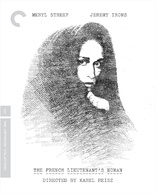
Movie rating
6.9 | / 10 |
Blu-ray rating
| Users | 0.0 | |
| Reviewer | 4.0 | |
| Overall | 4.0 |
Overview
The French Lieutenant's Woman (1981)
As Mike and Anna, two film actors involved in a tumultuous affair, and Charles and Sarah, the star-crossed Victorian lovers whom the actors portray, Meryl Streep and Jeremy Irons are at their compelling best. Just as his character Charles' reputation is ruined by the enigmatic Sarah, Mike finds he cannot accept the intangible affections of the wily Anna. The skillful interweaving of these two love stories — one period, one contemporary — yields a fascinating insight into the passion and mystery that can pull two people together...and just as easily tear them apart.
Starring: Meryl Streep, Jeremy Irons, Hilton McRae, Emily Morgan (I), Charlotte MitchellDirector: Karel Reisz
| Drama | Uncertain |
| Romance | Uncertain |
Specifications
Video
Video codec: MPEG-4 AVC
Video resolution: 1080p
Aspect ratio: 1.85:1
Original aspect ratio: 1.85:1
Audio
English: LPCM Mono (48kHz, 24-bit)
Subtitles
English SDH
Discs
50GB Blu-ray Disc
Single disc (1 BD)
Playback
Region A (locked)
Review
Rating summary
| Movie | 4.0 | |
| Video | 4.5 | |
| Audio | 5.0 | |
| Extras | 4.0 | |
| Overall | 4.0 |
The French Lieutenant's Woman Blu-ray Movie Review
Reviewed by Dr. Svet Atanasov August 17, 2015Nominated for for five Academy Awards, Karel Reisz's "The French Lieutenant's Woman" (1981) arrives on Blu-ray courtesy of Criterion. The supplemental features on the disc include an original trailer for the film; new video interview with film scholar Ian Christie; new documentary featuring new interviews with actors Meryl Streep and Jeremy Irons and film editor John Bloom; new video interview with composer Carl Davis; and more. The release also arrives with an illustrated leaflet featuring Lucy Bolton's essay "A Room of Her Own". In English, with optional English SDH subtitles for the main feature. Region-A "locked".
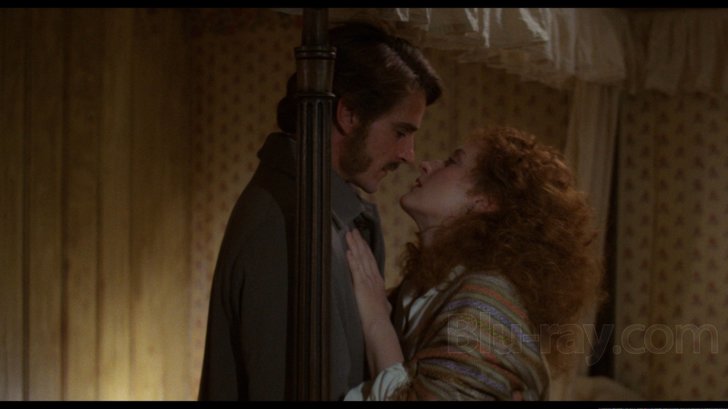
The lovers
The film is set like a giant jigsaw puzzle. There are bits and pieces that have to be properly arranged. There are themes and messages that need to be placed in the proper context in order to be understood. It is based on the famous Victorian novel by John Fowles, but Harold Pinter’s script gave it a distinctively modern identity.
There are two stories. The first begins on a film set and follows closely two actors, Anna (Meryl Streep, Sophie's Choice) and Mike (Jeremy Irons, And Now Ladies & Gentlemen), who are having an affair. They don’t know whether it would evolve into something more serious, but are not concerned about the future. They think that they have managed to keep it secret from everyone else.
The second story is from the film Anna and Mike are shooting. It is set in Victorian England and it is also about two people having an affair. Anna is Sarah, a young woman whose heart has been broken by a French naval officer, while Mike is Charles, a gentleman who collects fossils and has a special interest in Darwin’s work. The two also try to keep their relationship secret because Charles is expected to marry the daughter of a wealthy businessman.
The two stories constantly overlap and create some unusual contrasts. In the first the two lovers speak their minds and one knows exactly what they want and fear. Before they finish shooting the film, they are forced to determine the future of their relationship. It is not difficult to guess it -- even though Anna and Mike are actors, they have not been wearing masks. In the second story Sarah and Charles speak in codes and it is never perfectly clear whether they are sincere with each other. Like Anna and Mike, however, eventually they are forced to determine the fate of their relationship.
The ambiguity of the second story and the manner in which some of it is infused into the first story is what makes this film so unique. Indeed, the overlapping stories create contrasts that force one to reexamine the intentions of the four characters and eventually their identities. This is where the film evolves into a jigsaw puzzle. It takes two pieces -- the two stories come with different endings -- to completely alter the significance of the events that precede them and force one to reevaluate the entire film.
Pinter’s excellent script might have given the film its structure, but director Karel Reisz and the great cinematographer Freddie Francis gave it its soul. Indeed, it is difficult to imagine that without the brilliant framing, camera movement, and lighting the film would have been as alive and atmospheric as it is. The transitions -- between the stories and between the characters -- are also masterfully executed.
The two leads are good, but Streep’s character transformations feel a lot more convincing. As Sarah she infuses the film with a sense of mystery that gives it a poetic quality that is arguably its biggest strength. There are memorable cameos by Patience Collier as Sarah’s strict employer Mrs. Poulteney, Leo McKern as Dr. Grogan, and young Lynsey Baxter as Charles’ fiancée, Ernestina.
The film is complimented by a fantastic orchestral score courtesy of award-winning composer and conductor Carl Davis (Safety Last!, Our Hospitality). Some of the most memorable scenes, in particular, feature beautiful and brilliantly performed violin solos.
The French Lieutenant's Woman Blu-ray Movie, Video Quality 
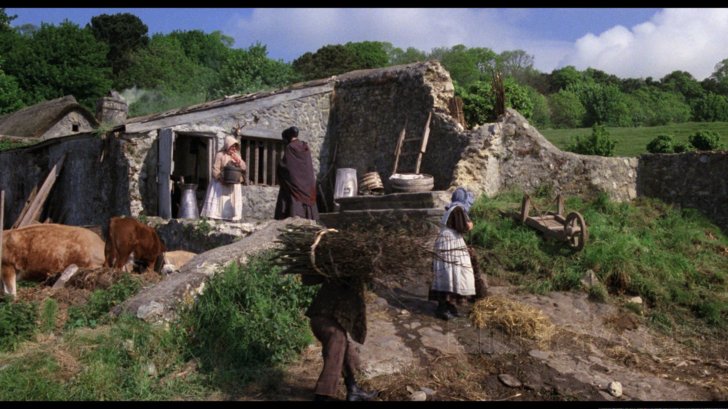
Presented in its original aspect ratio of 1.85:1, encoded with MPEG-4 AVC and granted a 1080p transfer, Karel Reisz's The French Lieutenant's Woman arrives on Blu-ray courtesy of Criterion.
The following text appears inside the leaflet provided with this Blu-ray release:
"This new digital transfer was created in 2K resolution on a Northlight film scanner from the original camera negative. Thousands of instances of dirt, debris, scratches, and splices were manually removed using MTI's DRS, while Digital Vision's Phoenix was used for small dirt, grain, noise management, flicker, and jitter. The original monaural soundtrack was remastered at 24-bit from the 35mm magnetic tracks. Clicks, thumps, hiss, hum, and crackle were manually removed using Pro Tools HD, AudioCube's integrated workstation, and iZotope RX4.
Transfer supervisor: Russell Smith.
Colorist: Gregg Garvin/Modern VideoFilm, Los Angeles."
The film looks very healthy and rich. Obviously, when the two stories overlap there are minor fluctuations in terms of contrast and color saturation, but they are all part of the original cinematography. Depth is also excellent. In fact, even the darker and gloomier footage from the first story looks wonderful. The overwhelming majority of the footage from the second story is slightly crisper, but this is due to the fact that light is typically captured differently. Grain is retained and well resolved throughout the entire film. Also, there are no traces of problematic sharpening adjustments. Overall image stability is outstanding. Debris, cuts, damage marks, scratches, and stains have been carefully removed. Finally, the encoding is good. (Note: This is a Region-A "locked" Blu-ray release. Therefore, you must have a native Region-A or Region-Free player in order to access its content).
The French Lieutenant's Woman Blu-ray Movie, Audio Quality 
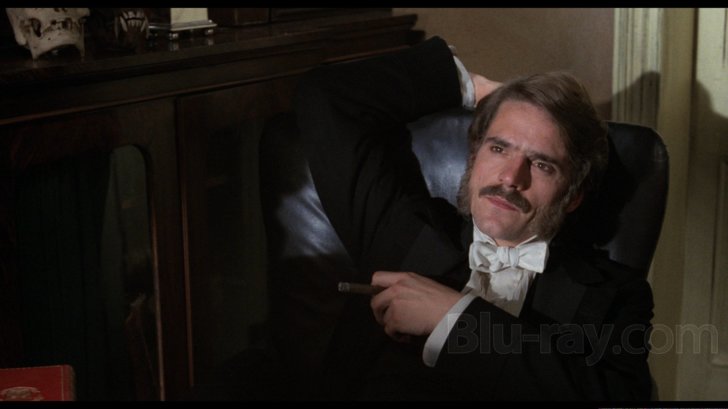
There is only one standard audio track on this Blu-ray release: English LPCM 1.0. Optional English SDH subtitles are provided for the main feature.
It is immediately obvious that the audio has been remastered because the gradual crescendi and decrescendi are beautifully balanced. This makes a big difference because Carl Davis' score has an integral part in the film and sometimes a simple music theme can effectively transform an entire episode (the two stories constantly overlap). The dialog is very clean, stable, and always easy to follow. There are no pops, cracks, audio dropouts, or digital distortions to report in our review.
The French Lieutenant's Woman Blu-ray Movie, Special Features and Extras 
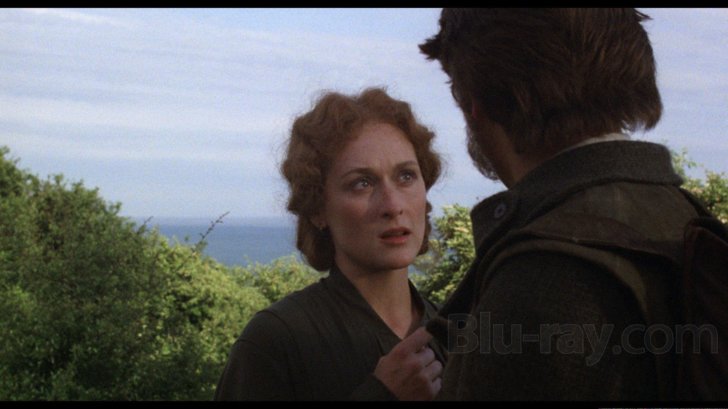
- Trailer - original trailer for The French Lieutenant's Woman. In English, not subtitled. (2 min, 1080p).
- Ian Christie - in this new video interview, film scholar Ian Christie explains why John Fowles novel that inspired Karel Reisz to shoot The French Lieutenant's Woman was once considered unfilmable, the depth and brilliance of Harold Pinter's screenplay, the creative environment in which the film was produced (multi-level narrative and modernist films were rather dominant at the end of the '70s), some of the stylistic similarities between David Lynch's The Elephant Man and The French Lieutenant's Woman, both of which were lensed by Freddie Francis, the identities of the two characters Meryl Streep plays, etc. The interview was conducted exclusively for Criterion in 2015. In English, not subtitled. (21 min, 1080p).
- The South Bank Show - presented here is an archival episode of London Weekend Television's The South Bank Show which takes a closer look at the screen adaptation of John Fowles' novel and the career and work of director Karel Reisz. Included in it are clips from interviews with writer John Fowles, Karel Reisz, and scenarist Harold Pinter. A few have some excellent comments about the various differences between the novel and the film (plenty of the material from the novel was omitted and some new elements were added up that are not in the novel). The episode was produced in 1981. In English, not subtitled. (52, 1080i).
- Emotional Uncertainties - in this new documentary, actors Meryl Streep and Jeremy Irons recall how they were approached to play their characters in The French Lieutenant's Woman and their initial reactions to John Fowles' novel and later on Harold Pinter's script, and discuss the unique manner in which the two stories in the film overlap, Freddie Francis' lensing, the shooting of the famous scene with Meryl Streep on the famous Cobb Wall, etc. Editor John Bloom also discusses the two contrasting stories, the visual style of the film, the performances of the two leads and the editing process, etc. The documentary was produced exclusively for Criterion in 2015. In English, not subtitled. (31 min, 1080p).
- Carl Davis - in this new video interview, composer Carl Davis discusses the scoring of The French Lieutenant's Woman. The interview was conducted exclusively for Criterion in the composer's home in England in 2015. In English, not subtitled. (22 min, 1080p).
- Leaflet - an illustrated leaflet featuring Lucy Bolton's essay "A Room of Her Own". (Lucy Bolton is a lecturer in film studies at Queen Mary University of London. She is the author of Film and Female Consciousness: Irigaray, Cinema and Thinking Women).
The French Lieutenant's Woman Blu-ray Movie, Overall Score and Recommendation 
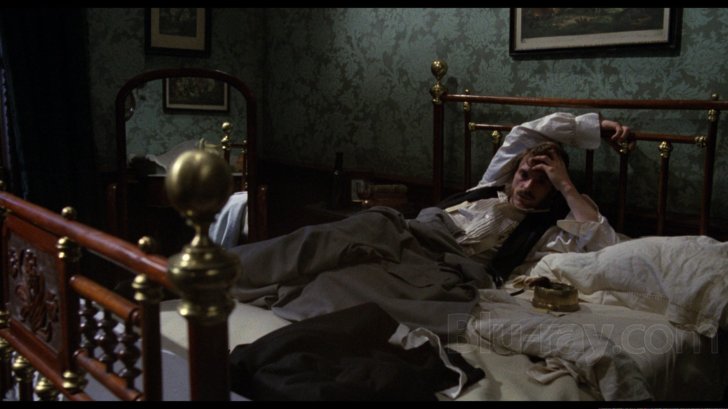
Set like a giant jigsaw puzzle, Karel Reisz's The French Lieutenant's Woman tells two stories about two couples existing in two drastically different worlds. Throughout the film, the two stories constantly overlap and force the viewer to compare and reevaluate the main protagonists' intentions and eventually their identities. The film was inspired by John Fowles' famous novel, which John Frankenheimer once described as unfilmable, and is based on a script by Nobel Prize-winning playwright Harold Pinter. It has been recently restored in 2K and looks really beautiful in high-definition. HIGHLY RECOMMENDED.
Similar titles
Similar titles you might also like

The Heiress
1949

The Magnificent Ambersons
1942

Tess
1979

Black Venus
1983

The Age of Innocence
1993

The Piano 4K
1993

Hester Street
4K Restoration
1975

Great Expectations
1946

Lady Macbeth
2016

The Portrait of a Lady
Special Edition
1996

Diary of a Chambermaid
1946

Charulata
চারুলতা / The Lonely Wife
1964

Children of Paradise
Les enfants du paradis
1945

The Wild Heart
Gone to Earth
1950

Vanity Fair
2004

Letter from an Unknown Woman
Signature Edition
1948

The Earrings of Madame de...
Madame de...
1953

Vanya on 42nd Street
1994

Jane Eyre
2011

Bright Star
2009